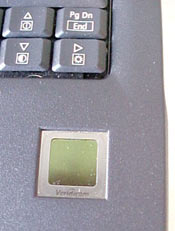While tokens or passwords can cracked or stolen,
biometric identifiers are much more difficult to reproduce. It is the task of
biometric systems to apply a mathematical algorithm to the identifier (retina,
or fingerprint for example) to determine if a user is a who they are pretending
to be.
 Some PC manufacturers now
offer laptops with built in capacitive biometric fingerprint identifications systems.
These authenticate users based on the similarity of their fingerprint to
that of a stored fingerprint created when the software is first
run.
Some PC manufacturers now
offer laptops with built in capacitive biometric fingerprint identifications systems.
These authenticate users based on the similarity of their fingerprint to
that of a stored fingerprint created when the software is first
run.
Add-on biometric devices are also available for securing laptops that
do not come equipped with these devices as stock. Use of Biometric devices
can make it harder for thieves to access data on a stolen laptop, especially as
many of the built-in solutions operate independently of whatever operating
system you may be using; meaning the failure of correct biometric
identification of the user will prevent the laptop from booting at
all.
Biometric devices have a few
disadvantages however. First and foremost, they are not foolproof by any means.
Although most devices err on the side of caution to reduce security risks, this
still can make them rather frustrating to use. Secondly, if your laptop did not
come with a biometric security device built in, you will have to purchase a
third-party add on that connects through the USB or PC card ports. While not
generally that expensive, these must function with the operating system, and
thus can be easily bypassed. They are very useful for securing data when
combined with encryption software however.
Current biometric devices must be
viewed as more of a password enhancement than an additional layer of security
for your laptop. While built-in fingerprint identifying devices in laptops can
have a security benefit, third-party devices give little benefit over simply
using secure passwords and encryption to protect your property.
Manufacturers of third party biometric
security systems include;
Targus ( WWW.targus.com)
DigitalPersona (https://www.digitalpersona.com/)
laptop identification
programs
if your laptop is stolen, having the
foresight to register the device with the manufacturer beforehand can give you a
much better chance of eventually getting it back. if you have registered your
laptop, when you report it as stolen, many manufacturers will track the serial
number of the device. if the laptop is subsequently brought in for repairs, a
record will exist. for obvious reasons, it pays to note the serial number of
your laptop down, even if you do not register it.
you
can also equip your laptop with an identification tag which provides proof of
ownership and acts as a deterrent to theft. the most popular of these is
the STOP program.
While more geared towards businesses, these programs can still help home users.
Personalize your
laptop
Along the same lines as the above ID
methods, personalizing your laptop can make it much more likely for you to get
it back in the event of theft. Though it may pain you to do it, placing your
name or other information somewhere on your laptop is a good idea. By engraving
identification information into the device itself, you provide yourself with
some very tangible descriptive information which you can provide to police.

